Iran To Stage ‘Defensive’ Exercise To Counter ‘Aerial Threats’
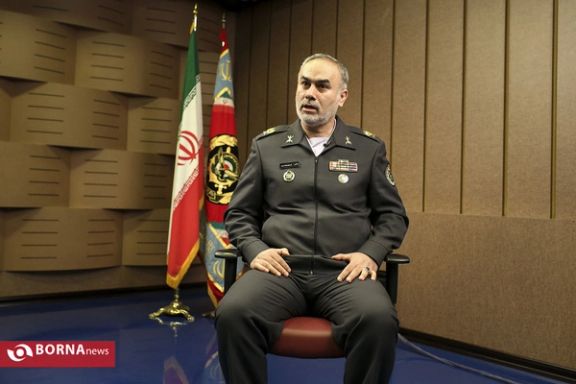
Iranian media say a "defensive" joint exercise by the Revolutionary Guard and the Islamic Republic Army will be held to counter "enemy aerial threats".

Iranian media say a "defensive" joint exercise by the Revolutionary Guard and the Islamic Republic Army will be held to counter "enemy aerial threats".
Brigadier General Abbas Farajpour, the spokesman for the "joint air defense exercise", said on Tuesday that the drills will be conducted in "two-thirds of the country's skies".
This comes after the National Security Committee of Iranian Parliament recently held a meeting with the officials of the ministry of intelligence regarding "recent events in Esfahan and Karaj".
Residents near Karaj, west of Tehran, published videos of explosions and anti- aircraft fire Thursday night, which the government media described as military drills by the IRGC.
One of these videos showed anti-aircraft tracer rounds soaring into the sky while an explosion can also be seen on the ground. There was no prior public notification of planned military exercises.
Some residents reported on social media that first a series of explosions were heard and then anti-aircraft guns began firing into the air.
Iran has been the scene of several suspected air attacks and sabotage operations since July 2020, largely ascribed to Israel. Any sound of aircraft or explosions usually jolts the population and leads to speculations of another attack taking place.
Serious acts of sabotage targeted Iran’s nuclear installations in 2020 and 2021 and several unexplained explosions occurred at military and naval bases.
The latest incident occurred on January 28 around midnight when a military manufacturing center in the city of Esfahan was attacked by drones.
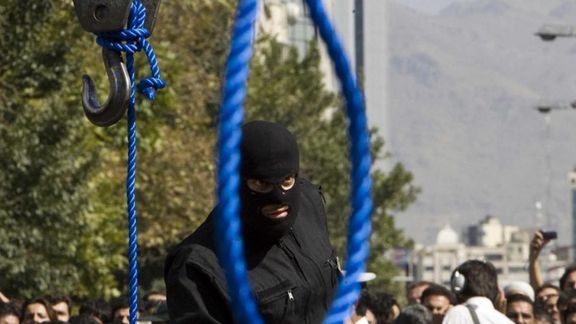
Over fifty countries from across the world have issued a joint statement addressed to the United Nations condemning the death penalty and executions in Iran.
The statement was deliveredby Vice Minister of Foreign Affairs of Costa Rica, Christian Guillermet at the 52nd session of the UN Human Rights Council in Geneva Tuesday.
“We are deeply concerned by the use of the death penalty in Iran. Several hundred people were reportedly executed in Iran between 2022 and 2023, including juvenile offenders,” he stated.
In recent months, Iran has handed down or sought to impose death sentences against dozens of individuals arrested in connection with their participation in protests following the death in custody of Mahsa Amini.
Iran has executed hundreds of prisoners since 2021 and in December hanged four protesters after sham trials.
“We are concerned by the nature of the offences for which the death penalty was applied the speed of the trials, lack of transparency, and credible reports that defendants did not have proper access to lawyers of their choosing and were subject to torture or other inhumane treatment,” read the statement.
The signatories called on Iran to respect the lives and voices of its people, to impose an immediate moratorium on the death penalty and to halt all executions, urging Iran to cooperate with all UN human rights mechanisms, including the Council’s Fact-Finding Mission.
Australia, Belgium, Canada, Denmark, France, Germany, Israel, Italy, Netherlands, Spain, Sweden, Switzerland, Ukraine, the UK, and the USA are among the countries that co-sponsored the joint statement.
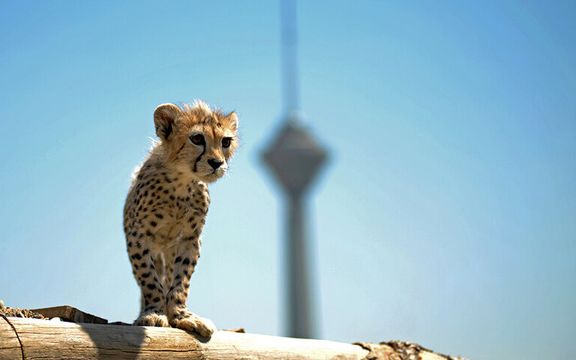
Iranians are sad and angry over the death of Pirouz, the last surviving Asiatic cheetah cub born in captivity in Iran that had become a symbol of hope for ongoing protests.
Pirouz, who died in the early hours of Tuesday due to kidney failure, became one of the icons of the current wave of protests against the regime after Grammy award winning singer-songwriter Shervin Hajipour mentioned his possible extinction in the revolution song ‘Baraye.’
Before its award for Best Song for Social Change at the Grammys 2023, Shervin’s song had become a viral sensation among millions of Iranians, who are protesting against the Islamic Republic for nearly six months now. The word ‘baraye,’ which means “for the sake of”, is repeated at the start of every line of the song, which is composed of a collection of tweets by Iranians bemoaning the situation in their country: “For dancing in the streets; for the fear of kissing; for Pirouz and its possible extinction”, and “for women, life, freedom”.
Doctors at Tehran’s Central Veterinary Hospital began dialysis procedures on Monday night but could not save the cub. “I apologize to the people on behalf of myself and all my colleagues because we couldn’t keep Pirouz alive,” said Amir Moradi, the head of the hospital, in a video message.
Pirouz’s two other siblings had died in May 2022. The second offspring of the Asiatic cheetah, called Iran, died apparently due to problems caused by poor quality milk just two weeks after the first cub from the litter died, purportedly due to “congenital malformation of the left lung”. Their deaths drew widespread criticism, prompting Iran’s Department of Environment to set up a fact-finding taskforce to assess any shortcomings and negligence in dealing with the reproduction process. No findings were announced by the taskforce.
The cubs were born in the Touran Wildlife Refuge by caesarean section on May 1, in what the department said was the first birth of an Asiatic cheetah in captivity. Iran is the last country in the world where the critically endangered Asiatic cheetah can be found in the wild, where authorities launched a United Nations-supported protection program in 2001. In January, deputy environment minister Hassan Akbari said only a dozen individuals were left in the wild -- down from an estimated 100 in 2010.
Social media has exploded with photos and artworks created for Pirouz. People are also re-sharing a video showing Pirouz’s last moments in hospital. Many people blame the authorities for a lack of care, but some believe that the negligence was intentional as Pirouz -- literally meaning Victor in Persian -- had become a symbol of triumph for the ongoing protests. Pro-regime hardliners had earlier called for changing the name of the cub to a religious one.
As hashtags about Pirouz have become trendy on social media, some people and activists used the opportunity to speak about the environmental conservationists jailed in the country since 2018, condemning the regime for imprisoning the most efficient and erudite scientists.
“Wasn’t it enough for you that you detained the best wildlife scientists whose goal was to protect the cheetahs in their habitat?” asked Majid Ghazanfari, a conservationist and former TV presenter that left the state broadcaster in support of the protests, slamming the authorities for their inefficient project for reproduction in captivity. There are reports in media that the Pirouz’s mother, Iran, is pregnant again.
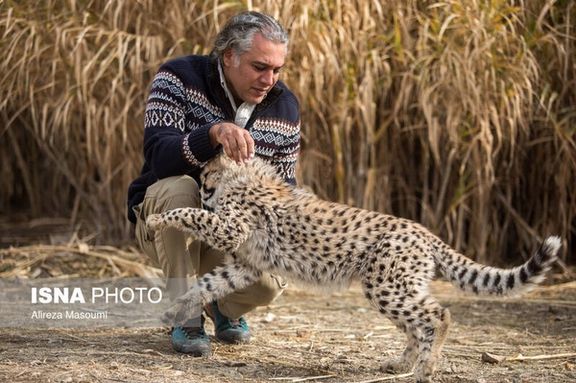
Iranian sociologist Mohammad Fazeli tweeted that reactions to Pirouz’s death indicates that people have become more sensitive about environmental issues. Let's express similar sensitivity for the death of water bodies, soil erosion, destruction of the forests and extinction of Zagros oak trees, constructions in the northern forests, pasture erosion, and other destructive projects and anti-environmental economy, he said, adding, “Pirouz died, long live environmental awareness and sensitivity!”
Earlier in the month, Etemad daily reported that while the Islamic Republic has launched wide-scale propaganda regarding the conditional release of some political prisoners, there has been no amnesty for environmental activists. According to the report, there are still seven environmental activists behind bars while more than five years have passed since they were arrested. Nine environmentalists and ecologists were arrested in 2018 on charges of espionage. All were members of the Persian World Heritage Foundation, an NGO dedicated to conserving wildlife in Iran, and are serving sentences from four to 10 years. Kavous Seyed-Emami, the NGO’s founder, was found dead in his cell two weeks after his detention, with the authorities reporting suicide and the family denying the claim.
Earlier in the week, imprisoned civil and human rights activist Narges Mohammadi, along with 20 of other female political prisoners, issued a statement calling for the release of the environmentalists. They said the case against them is bogus and countless human rights violations are evident in it.
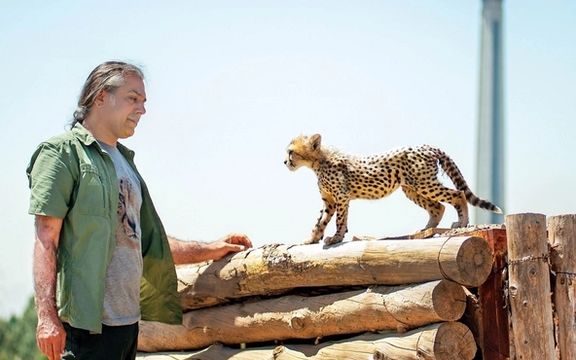
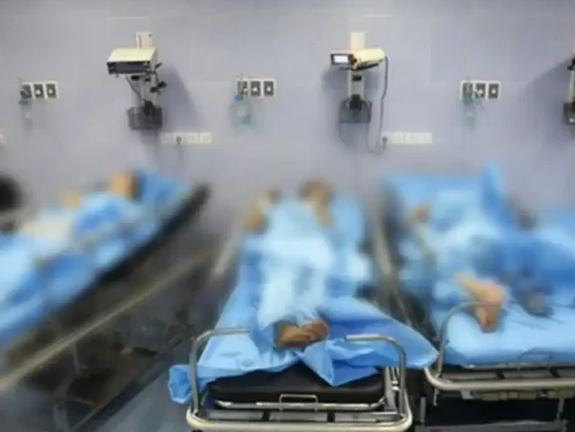
The Islamic Republic’s health minister says a “mild poison” has been causing the widespread poisoning of female students in Iranian schools.
According to Tasnim News Agency, Bahram Einollahi stated Tuesday that to find out “how the poison was produced and if it was a deliberate move is not within the ministry’s duties.”
Iranian students' serial poisoning began on November 30 in the religious city of Qom near Tehran with hundreds of students hospitalized in several cities.
A video posted on social media on Tuesday showed schoolgirls lying down on the ground in Khayyam High School in Pardis town near Tehran having difficulty breathing after inhaling a poisonous gas.
Some users called it another chemical attack at a female high school in Iran. They alleged that members of Basij paramilitary organization of the IRGC threw canisters containing chemical gas into Khayyam high school.
A parent of one of the poisoned students said in another video that the school officials claimed the students were poisoned after a gas pipe leaked, but the gas department said gas leak has not been the cause of the incident.
Meanwhile, Ahmad Amirabadi, a member of the Iranian parliament from Qom said during a session Tuesday that if the poisonings was deliberate, “security and law enforcement officials should pursue the issue and deal with the perpetrators.”
Iran’s deputy education minister, Younes Panahi, told reporters on Sunday that “After the poisoning of several students in [the city of] Qom … it was found that some people wanted all schools, especially girls’ schools, to be closed.”
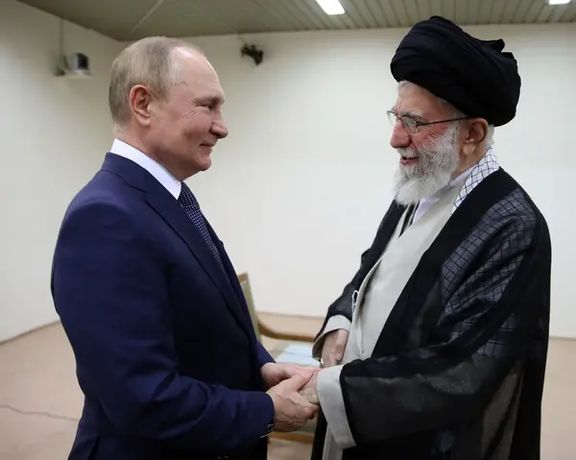
Iran’s march toward nuclear weapons and its deepening alliance with Russia is driving the Middle East closer to war, a scholar has argued in the Wall Street Journal.
Walter Russel Mead, Distinguished Fellow in Strategy and Statesmanship at the Hudson Institute, after a trip to Israel says that the Biden administration faces a serious challenge by the revisionist states of Russia, China and Iran that want to weaken US power and influence.
“For Mr. Putin, a major military confrontation in the Middle East would be an unmitigated blessing. Oil prices would spike, filling Moscow’s coffers and intensifying pressures on Europe, Mead argues, adding that in case of a regional war “The Pentagon would have to split available weapons between Ukraine and Middle East allies.”
The Biden administration and European powers have expressed deep concern over Iran’s growing military ties with Russia. They have said that a resumption of nuclear talks with Tehran is contingent on its change of policy in supplying weapons to Moscow. Iran has so far supplied hundreds of kamikaze drones to Russia that are used against Ukraine.
Mead also warns that Putin might decide to strengthen Iran’s military, “limiting Israel’s ability to attack Iran’s nuclear facilities,” which “could force Israel into a pre-emptive strike” and a regional war.
He also argues that a “hawkish Middle East posture” by the United States could deter Russia and Iran, but that is what “many Democrats—including senior Biden officials—viscerally loathe.”
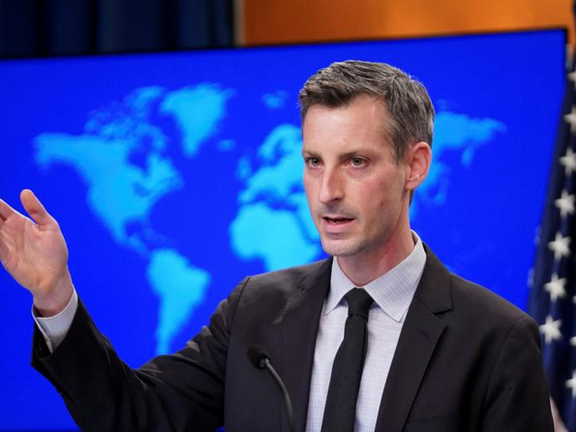
US State Department Spokesperson Ned Price says Tehran lies about receiving messages from Washington about resuming negotiations over the nuclear deal.
During a briefing on Monday Price said he cannot answer why time to time Iranian officials claim that the US is interested in resuming nuclear talks and sends messages in this regard.
“Only Iranian officials can speak to why they continue to tell these lies. Iranian officials can repeat their line as often as they want, but it doesn’t change the underlying facts. A revival of the JCPOA has not been on the agenda for months. We have not conveyed any message to the contrary. I can’t speak to why Iranian officials may be trying to deceive the rest of the world,” noted Price.
The Iranian foreign minister’s claims came as Iran’s currency, the ria,l dropped to unprecedented lows on Sunday, creating more panic in the country. Optimistic statements about the likelihood of a nuclear deal and lifting of sanctions usuallu help the Iranian currency to rally.
Elsewhere in his remarks, Price referred to Iranian Foreign Minister Hossein Amir-Abdollahian’s statements at the UN Human Rights Council on Monday, saying his appearance in the human rights council serves as a “disturbing reminder to the world of the hypocrisy of the Iranian regime….In light of this, we did not have our ambassador in the chair when Iran spoke.”
Responding to Amir-Abdollahian’s comments, who said in his remarks on Monday that “Human rights is at the – are at the core of our values;” and “No state should coerce others to self-styled interpretation of human rights,” Price stated that this is an excuse often heard from countries with the worst human rights records around the world, claiming that human rights are subjective, and they need to be context-dependent.
“Iran is a member-state of the UN. The UN Charter is predicated on some of the same ideals that are in the Universal Declaration of Human Rights, the idea of universal rights around the world. Iran can’t have it both ways. Iran cannot purport to be a member, a member-state of the UN, while making these arguments that these universal rights don’t apply to the people of Iran,” stressed Price.
Tens of participants at the UN Human Rights Council walked out when the Islamic Republic’s foreign minister spoke at the 52nd session of the body on Monday.
Many seats were empty while Hossein Amir-Abdollahian was delivering his speech at UHRC’s headquarters in Geneva, following calls by activists urging delegates to walk out in reaction to the regime’s gross human rights violations, especially during the ongoing crackdown on antigovernment protests.
Trying to manipulate the realities on the ground, the Iranian FM said, “The peaceful assemblies that took place in my country following the sad death of Mahsa Amini... turned violent following the malign interference by some terrorist elements. In this respect, several Persian language TV channels based in the US and the UK, acted as provocateurs of hatred and propagators of violence.”
He also claimed that an investigation was ongoing and that all the people that were arrested during the protests have been released. He also claimed that "no one has been killed," in response to Iran International’s correspondent who asked him about the Islamic Republic's killing of protesters including a 10-year-old kid.
The council was one of the first international bodies to react to the current wave of protests. In November, the council voted to launch an independent investigation into the regime’s deadly repression, which has killed more than 500 civilians, including 70 children.